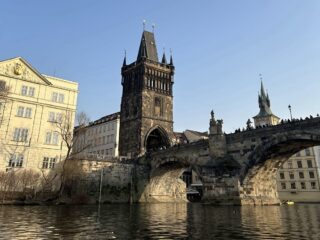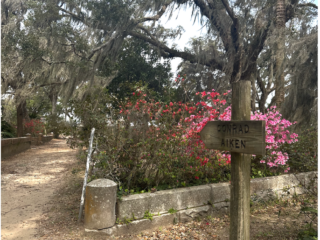by Nicholas J. Klenske
Perched on the tip of the African Continent, sandwiched between the crash of the Indian Ocean and the roll of the Atlantic, Cape Town exists in a tango of its past, present and future. Often described as capturing the free-spirit attitude of San Francisco circa the 1950s, at first glance Cape Town may seem bohemian and reckless. But at the turn of a corner its apartheid history and resulting current racial and economic struggles continue to be felt.
With this historic setting, Cape Town has naturally enjoyed a colorful and vibrant arts scene. From visual to performing, literary to musical, the city tells its culturally diverse story through the arts. One of the most prominent of these storytellers is the Nobel Prize winning author J.M. Coetzee, the South African native who not only lived and worked in the city – both during and post-apartheid – but also bases many of his works within its storied setting.
The City’s Troubadour
As a Cape Town native born in 1940, Coetzee came of age in the midst of an apartheid and civil war torn South African landscape. Best known as the 2003 Nobel Prize winner, Coetzee’s father was an attorney and his mother a school teacher. His roots are Dutch, making him part of the white Afrikaans population – an important component to his nation’s colorful cultural mosaic. As a youth, he attended St. Joseph’s Catholic College and, later, the University of Cape Town, where he received degrees in English and Mathematics.
In the 1960s Coetzee fled the political turmoil of the city and relocated to London, where he worked as a computer programmer for IBM. But, by 1963 he was back in Cape Town earning a Masters degree from the University. He later moved to the United States to earn his Ph.D. in linguistics from the University of Texas.
After graduation Coetzee commenced his academic career as a professor of English at the State University of New York in Buffalo. However, due to his prominent activities in the anti-war protest of the late 1960s and early 1970s, he was denied permanent residency in the United States and again returned to Cape Town and assumed a position as professor of English literature at his alma matter. Here he wrote and taught until 2002, when he retired and moved to Adelaide, Australia where he became a citizen in 2006.
The Cape as Setting, Plot and Character
Coming of age in such a volatile city with such an interesting social history has had a significant effect on Coetzee’s cannon of work. As he developed as a writer, particularly while working as a professor at the city’s university, Cape Town was regularly utilized as the setting, plot and sometimes even main character in many of the author’s works. From the civil war setting of Life and Times of Michael K to the modern university backdrop of Disgrace, Cape Town has played a significant role in Coetzee’s identity as a writer. At the same time, Coetzee’s works serve as a comprehensive catalog of the area’s history – creating a virtual timeline of how the Cape Town of today came to be.
In his first novel, 1974’s Dusklands, the author sets the stage for many of his works to follow, exploring how colonialism and imperialism led to the apartheid, racially divided nation of South Africa and such cities as Cape Town. The story is set in the 18th century where a hunting party makes their way into the yet unexplored interior of South Africa. During the hunt, the party has initial contact with some of the natives, which eventually leads to an organized massacre of the tribe.
From here Coetzee moves into exploring the relationship that is created between the colonizer and colonized. In 1977’s In the Heart of the Country he explores the violent rift that begins to tear the city into two by using the metaphor of a daughter and father who – after the father takes an African mistress – find their relationship splintered.
The Life and Times of Michael K, published in 1983, is the author’s first Booker Prize winning work. Unlike his other Booker Prize winner, Disgrace, Michael K is set in the heart of civil war- ridden, apartheid Cape Town and the surrounding Cape Peninsula.
Opening in a war devastated Cape Town, the reader is introduced to Michael K, a black gardener who finds himself caring for his gravely ill mother. As Cape Town has been reduced to a slum of racist laws, the mother and son decide they must leave the city and make their way to the country and towards his mother’s hometown of Prince Albert.
Pushing her through military checkpoints via a makeshift wheelbarrow, often under the cover of nightfall, the journey is cut short when she dies in a hospital located on the outskirts of Cape Town. Following her cremation, Michael K continues his journey in order to return her ashes to her birthplace. Along the way he becomes a fugitive, gardener, hermit and prisoner. After escaping a military prison, he returns to Cape Town – a city that continues to hold no promise but nonetheless allows him to connect to something familiar.
Although it plays a relatively minor role, Cape Town sets the scene that drives the story of Michael K: a modern city wrapped in the grip of a racist war. It also gives the avid reader of Coetzee a unique perspective of the city during the peak of apartheid.
In his 1999 Booker Prize winning Disgrace, the main character, David Lurie, is a divorced, dissatisfied professor of English at a Cape Town-based technical university. The time period is post-apartheid, and the story’s theme focuses on the disillusion and general disarray of the nation that exists after the fall of its racist system.
Lurie’s personal disgrace begins with him seducing a student and failing to take any action to protect himself from the consequences. As a result, Lurie loses his job, reputation, looks and dreams. Finding Cape Town to be empty and unable to provide him anything further, he moves in with his daughter in the East Cape providence.
Perhaps like no other post-apartheid novel, Disgrace introduces the reader to a new Cape Town and South Africa – one that finds itself engulfed in a different type of violence and conflict. Instead of the perfection many hoped to see after the fall of apartheid, in Disgrace all races, individuals and even Cape Town itself find themselves feeling disgraced.
Finally, in his two part semi-autobiographical series, Scenes from a Provincial Life, Coetzee takes the reader into the details of his childhood and youth. In the first part, the author focuses on his childhood growing up in apartheid-era Cape Town.
Written as a novella, Coetzee tells his boyhood story in the third person and through the eyes of a young boy trapped between the purgatory of childhood and adolescence. Not only does this book shed light on why the writer writes how he does by discussing such aspects of his life as his complex relationship with his mother and family, but also on his difficulty with coming to grasps with Cape Town’s racial segregation, even as a young boy. This challenge is presented in the larger sense of a struggle with identity and purpose. In the second part, entitled Youth, the author begins with his fleeing of a turmoil-ravaged Cape Town to London and how his South African past continued to haunt him.
An Inescapable Past
Put together, Coetzee’s work of fiction creates a comprehensive timeline of Cape Town’s history. From the initial explorations to colonization, from apartheid war to a post-horror loss of identity – taken together they tell the story not only of a legendary city, but also of a legendary author.
Even though J.M. Coetzee is now an Australian citizen living in Adelaide, Australia, the ghost of Cape Town, particularly the city’s history, continues to influence him. For example, in his latest book, Diary of a Bad Year, Coetzee further plays with the concepts of human cruelty, violence and racism. Written as a mix of fiction and diary-based entries, the themes range from terrorism to the war in Iraq – all modern day occurrences that have the shadows of Cape Town cast over them.
Nicholas J. Klenske is a freelance writer living in Brussels, Belgium. His work has appeared in The Milwaukee Journal Sentinel, New Haven Advocate and TransistionsAbroad.com. Contact him through www.KlenskeInk.com.
*
More Articles on Africa
The Studio Musuem in Harlem Presents Africa Comics
The Oral Literary Tradition of Ghana: Folklore & Proverbs
A Mountain Climber’s Dream: Vivienne de Watteville’s Mount Kenya
Karen Blixen’s Kenyan Paradise








